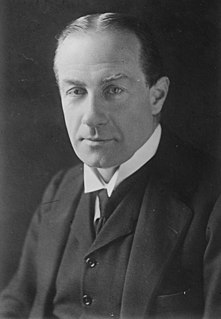
The 1997 United Kingdom general election was held on Thursday 1 May 1997, five years after the previous general election on 9 April 1992, to elect 659 members to the British House of Commons. Under the leadership of Tony Blair, the Labour Party ended its eighteen-year spell in opposition and won the general election with a landslide victory, winning 418 seats, the most seats the party has ever held to date, and the highest proportion of seats held by any party in the post-war era. For the first time since 1931, the outgoing government lost more than half its parliamentary seats in an election.

Sir Henry Urmston Willink, 1st Baronet, was a British politician and public servant.

The 1935 United Kingdom general election was held on Thursday 14 November 1935 and resulted in a large, albeit reduced, majority for the National Government now led by Stanley Baldwin of the Conservative Party. The greatest number of members, as before, were Conservatives, while the National Liberal vote held steady. The National Labour vote also held steady, but the resurgence in the main Labour vote caused over a third of their MPs, including party leader Ramsay MacDonald, to lose their seats.

Alfred Ernest Brown was a British politician who served as leader of the Liberal Nationals from 1940 until 1945.

Sir Frederick Harold Stewart was an Australian businessman, politician and government minister. His continuing political commitment was to the establishment of a national insurance scheme and the shortening of working hours to improve social conditions during the Great Depression, despite the opposition of his own party.
The Spen Valley by-election, 1940 was a by-election held for the British House of Commons constituency of Spen Valley on 1 June 1940. The seat had become vacant when the National Liberal Member of Parliament Sir John Simon, had been elevated to the peerage as Viscount Simon. Simon had held the seat since the 1922 general election.
The Nottingham Central by-election, 1940 was a parliamentary by-election held for the British House of Commons constituency of Nottingham Central on 19 July 1940. The seat had become vacant when the Conservative Member of Parliament (MP) Sir Terence O'Connor had died on 7 May 1940. O'Connor had held the seat since a by-election in 1930.
The Nottingham Central by-election, 1930 was a parliamentary by-election held on 27 May 1930 for the British House of Commons constituency of Nottingham Central.
The Newcastle upon Tyne North by-election, 1940 was a parliamentary by-election held on 7 June 1940 for the British House of Commons constituency of Newcastle upon Tyne North.
The Combined Scottish Universities by-election, 1938 was a by-election held from 21 February to 25 February 1938 for the Combined Scottish Universities, a university constituency of the British House of Commons.

Harcourt Johnstone, nicknamed Crinks, was a British Liberal Party politician.
The City of London by-election, 1938 was a by-election held on 6 April 1938 for the British House of Commons constituency of City of London, which covered the "Square Mile" which was the United Kingdom's traditional financial district.
The City of London by-election, 1940 was a by-election held on 5 February 1940 for the British House of Commons constituency of City of London, which covered the "Square Mile" which was the United Kingdom's traditional financial district.
The former New Zealand parliamentary electorate on the western inner city of Auckland, was known as City of Auckland West from 1861 to 1890, and then Auckland West from 1905 to 1946.
The Leeds North East by-election, 1940 was a parliamentary by-election in England held on 13 March 1940 to elect a new Member of Parliament (MP) for the House of Commons constituency of Leeds North East.
The Hythe by-election, 1939 was a parliamentary by-election held on 20 July 1939 for the British House of Commons constituency of Hythe.
The Glasgow Pollok by-election, 1940 was held on 30 April 1940 in the Glasgow Pollok constituency of the Parliament of the United Kingdom. The election was caused by the death of the previous MP, Sir John Gilmour.
The 1940 Hong Kong municipal election was held on 29 February 1940 for the one of the 2 unofficial seats in the Urban Council of Hong Kong. It was the first contested election since the establishment of the Urban Council of Hong Kong and also the last one before the outbreak of the Pacific War. The next election to be held would be the 1952 election, twelve years later.
The Southampton by-election of 1940 was held on 27 November 1940. The by-election was held due to the elevation to the peerage of the incumbent National MP, Sir John Reith. It was won by the Liberal National candidate Russell Thomas.






